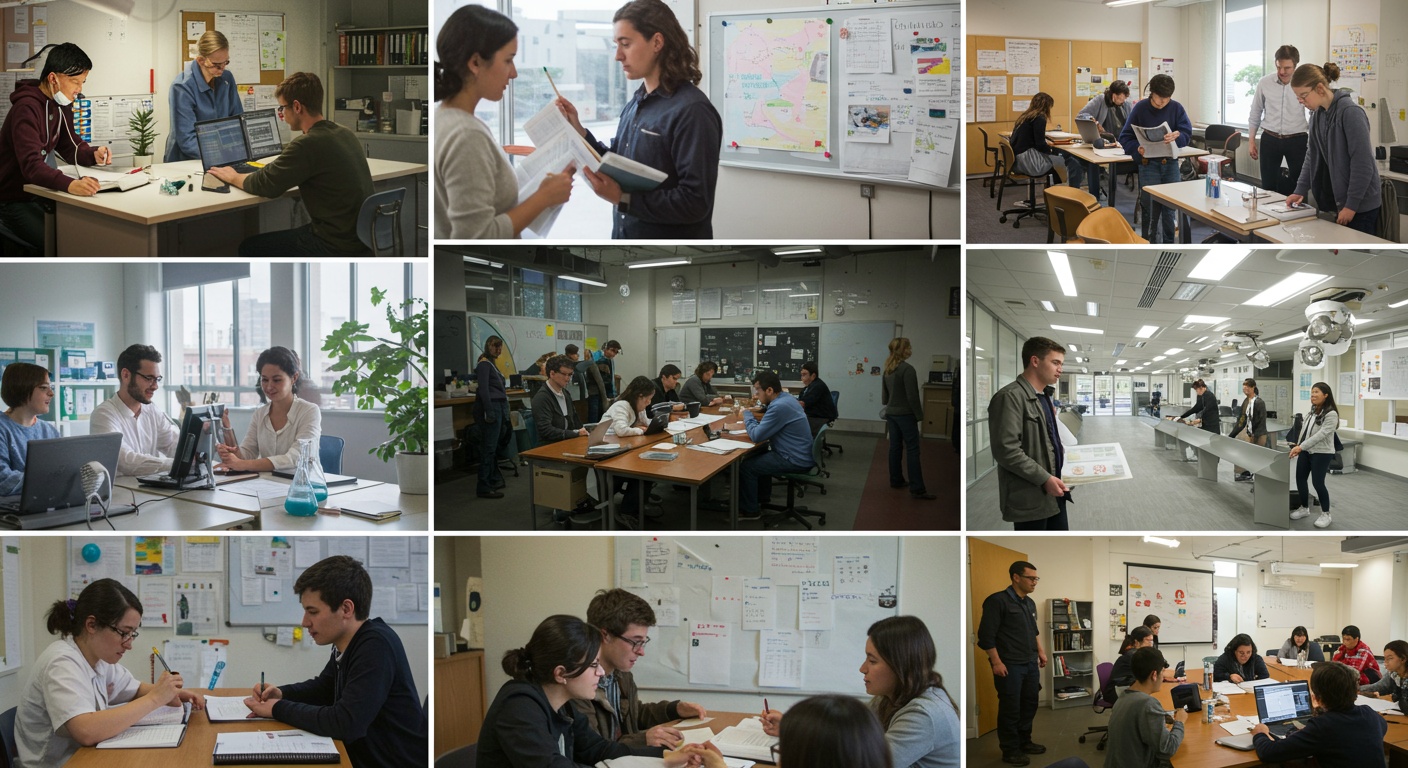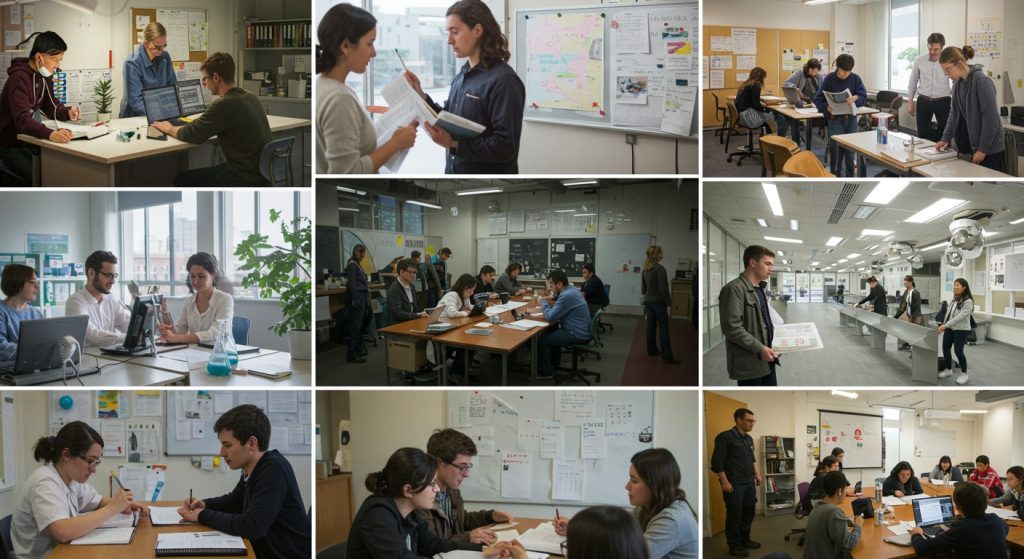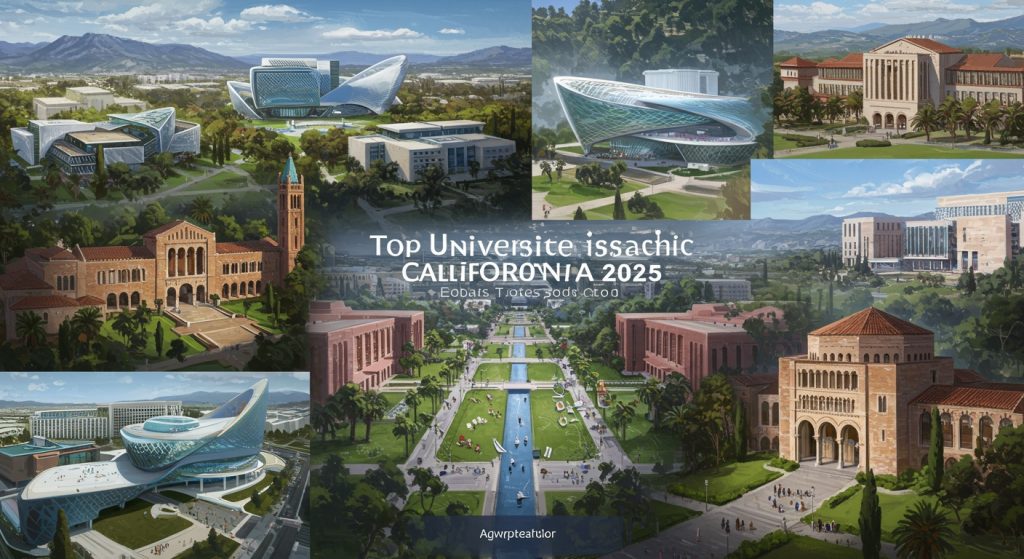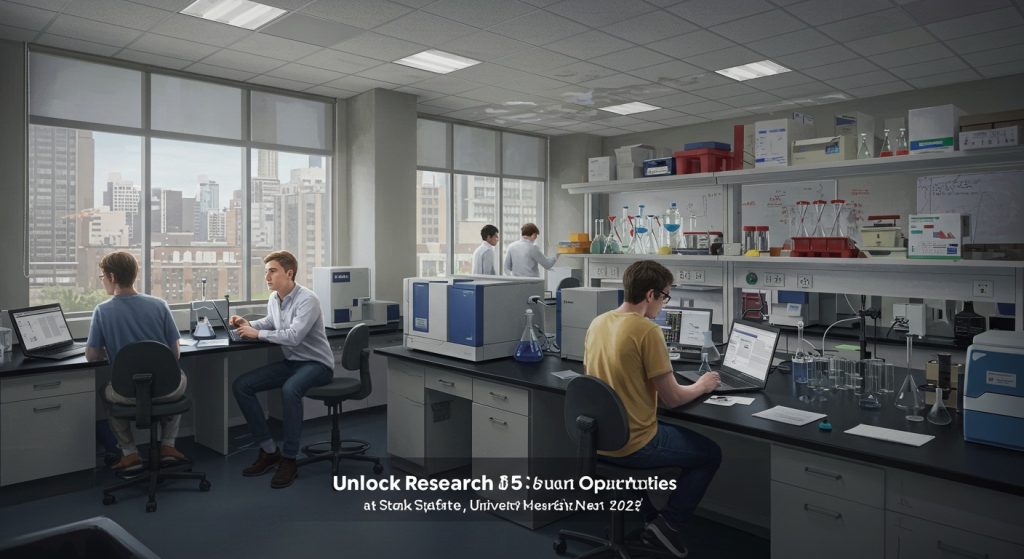Today’s dynamic professional landscape demands more than theoretical knowledge; it necessitates practical engagement. Public universities actively cultivate robust experiential learning ecosystems, offering students unparalleled opportunities. Imagine contributing to cutting-edge research in AI ethics, designing sustainable engineering solutions, or engaging in immersive clinical rotations within urban health initiatives. These programs, increasingly integrating industry partnerships and leveraging remote work platforms, directly equip graduates with critical soft skills, advanced technical proficiencies. Invaluable professional networks. This transforms education from passive reception into active, transformative participation, directly bridging academic rigor with real-world impact and immediate career readiness.

Understanding Experiential Learning: Beyond the Textbook
In today’s dynamic world, a degree alone isn’t always enough to stand out. Employers increasingly seek graduates who possess not just theoretical knowledge. Also practical skills, real-world experience. A demonstrated ability to apply what they’ve learned. This is where experiential learning comes into play. Far more than just passive observation, experiential learning is an educational philosophy that emphasizes learning by doing, reflecting. Applying knowledge in authentic contexts.
At its core, experiential learning moves education out of the traditional lecture hall and into real-world settings. It’s about direct engagement with the subject matter, fostering deeper understanding and skill development. Think of it as a cycle:
- Concrete Experience
- Reflective Observation
- Abstract Conceptualization
- Active Experimentation
Engaging in a new activity or re-interpreting an existing experience.
Reviewing and reflecting on the experience from various perspectives.
Forming new ideas or modifying existing abstract concepts based on the reflection.
Applying these new ideas or concepts to new situations, leading to new experiences.
This iterative process allows students to internalize lessons more effectively, develop critical thinking skills, problem-solving abilities. A nuanced understanding of their chosen field. It bridges the gap between academic theory and professional practice, preparing students not just for a job. For a career.
Why Public Universities Are Powerhouses for Experiential Learning
When considering where to pursue an education rich in hands-on experiences, public universities often emerge as leading institutions. Their fundamental mission, rooted in serving the public good, naturally aligns with providing accessible, impactful learning opportunities that extend beyond traditional academics. Here’s why public universities, including many prominent State-wise Universities, are uniquely positioned to offer a wealth of experiential learning:
- Vast Resources and Infrastructure
- Strong Community and Industry Ties
- Diverse Student Body and Faculty
- Commitment to Accessibility and Public Service
- Scale and Variety
Public universities typically boast extensive facilities, state-of-the-art labs, research centers. Large campuses that can support diverse experiential programs. They often have dedicated career services departments, alumni networks. Community engagement offices specifically designed to connect students with opportunities.
Being publicly funded, these institutions are deeply embedded within their local and regional communities. This fosters robust partnerships with government agencies, non-profits, local businesses. Industries, creating a constant flow of internship, service-learning. Research opportunities.
The sheer size and diversity of public university student populations mean a broader range of perspectives and collaborative opportunities. Faculty members often have extensive industry experience and research connections, opening doors for students to participate in cutting-edge projects.
Public universities are often driven by a mission to provide affordable, high-quality education to a broad demographic. This commitment extends to ensuring experiential opportunities are accessible to all students, regardless of their background or financial situation, often through funded programs or grants.
With their larger scale, public universities can offer an unparalleled variety of programs across numerous disciplines, from engineering and health sciences to arts and humanities, ensuring a fit for almost any student’s interests.
Diverse Avenues: Unpacking Experiential Opportunities
Public universities offer a rich tapestry of experiential learning opportunities, each designed to provide unique skills and insights. Let’s explore some of the most prominent types:
Internships and Co-operative Education (Co-ops)
These are perhaps the most well-known forms of experiential learning, offering students the chance to work in a professional setting, applying classroom knowledge to real-world tasks. They provide invaluable networking opportunities and insights into specific industries.
- Internships
- Co-operative Education (Co-ops)
Typically short-term (e. G. , a summer, a semester), sometimes unpaid or minimally paid, focused on gaining exposure and applying theoretical knowledge. Many universities, particularly large State-wise Universities, have dedicated internship coordinators who help students find placements and even offer academic credit. For instance, a marketing student might intern at a local non-profit, managing their social media campaigns, or an engineering student might assist in product development at a tech firm.
More structured and often longer-term (e. G. , multiple semesters, alternating between academic study and full-time work), co-ops are almost always paid and provide deeper, more immersive professional experience. They are common in fields like engineering, computer science. Business. A student might work for six months at a company, then return to classes, then work again, gaining significant professional responsibility.
Here’s a quick comparison:
| Feature | Internship | Co-op |
|---|---|---|
| Duration | Short-term (1-4 months typically) | Longer-term (multiple semesters, often 6-12 months total) |
| Compensation | Can be paid, unpaid, or stipend | Usually paid |
| Focus | Exposure, exploration, initial skill application | Deep immersion, significant responsibility, career development |
| Academic Integration | Often for credit, less structured integration | Highly integrated, often alternates with academic semesters |
Service-Learning
Service-learning combines community service with academic instruction and reflection. Students apply course content to address community needs, enhancing their civic responsibility while deepening their understanding of academic concepts. For example, an urban planning student might work with a city council to develop a sustainability plan for a local park, while a public health student might organize a health awareness campaign for underserved populations. Many public universities incorporate service-learning directly into course curricula, fostering a sense of civic engagement among students.
Undergraduate Research
For students interested in delving deeper into a specific academic discipline, undergraduate research offers an unparalleled opportunity. Students work alongside faculty mentors on research projects, contributing to new knowledge. This can involve anything from conducting experiments in a lab, analyzing data, or delving into archival research for a humanities project. Many public universities, especially those with strong research profiles, offer programs like “Undergraduate Research Fellowships” or “Summer Research Opportunities,” giving students hands-on experience with the research process, from hypothesis formation to data analysis and presentation. This experience is particularly valuable for students considering graduate school or careers in R&D.
Study Abroad and Field Schools
While often viewed as cultural experiences, study abroad programs and field schools are potent forms of experiential learning. They immerse students in new environments, challenging them to adapt, problem-solve. Apply their knowledge in unfamiliar cultural, social. Academic contexts.
- Study Abroad
- Field Schools
Whether it’s a semester exchange, a faculty-led short-term program, or an independent study, living and learning in another country develops global awareness, cross-cultural communication skills. Independence. A business student might study international trade in Germany, while an art history student might take courses on Renaissance art in Italy.
These highly specialized programs, common in disciplines like archaeology, geology, environmental science. Anthropology, take students directly to the site of study. Imagine an archaeology student spending a summer excavating a historical site, or an environmental science student conducting fieldwork in a rainforest. These experiences provide intensive, hands-on training that cannot be replicated in a traditional classroom.
Simulations and Capstone Projects
Within the university setting itself, many programs incorporate high-fidelity simulations and capstone projects to provide experiential learning. These are particularly valuable in fields where real-world mistakes can be costly or dangerous.
- Simulations
- Capstone Projects
From medical students practicing surgery in a simulated operating room to business students running a virtual company in a competitive market, simulations offer a safe space to make decisions, learn from mistakes. Hone skills. Journalism students might run a campus newsroom, producing real content on tight deadlines.
Often the culminating experience for a degree program, capstone projects require students to synthesize their knowledge and skills to solve a complex, real-world problem. This might involve designing a new product, developing a comprehensive business plan for a startup, or conducting an in-depth policy analysis for a local government agency. These projects frequently involve external partners, providing a genuine client experience.
Student Organizations and Leadership Roles
Beyond formal academic programs, participation in student organizations and taking on leadership roles provides invaluable experiential learning. Leading a student club, organizing campus events, or participating in student government teaches project management, teamwork, communication. Problem-solving skills in a low-stakes environment. For example, a student leading the university’s debate team develops critical thinking and public speaking, while a student organizing a charity run gains experience in logistics, marketing. Fundraising.
Navigating and Maximizing Experiential Opportunities
With so many options available, how can students effectively find and make the most of experiential learning opportunities at public universities?
Finding Your Path: Actionable Steps
- Connect with Career Services
- Engage with Faculty
- Explore Departmental Resources
- Attend University Fairs and data Sessions
- Leverage Alumni Networks
This is often the first and most crucial stop. Public university career services departments are incredibly well-resourced, with dedicated staff, databases of opportunities, resume and cover letter workshops, interview coaching. Employer networking events. They are experts at connecting students with internships, co-ops. Job placements.
Professors are often deeply involved in research, community projects. Industry connections. Express your interest in their work, ask about research assistant positions, or inquire if they know of any relevant opportunities. Many faculty members are eager to mentor students who show initiative.
Many academic departments have their own internship coordinators, bulletin boards (physical or virtual). Dedicated websites listing opportunities specific to their field. For example, the Electrical Engineering department might have a list of local tech companies seeking interns.
Career fairs, study abroad fairs. Research symposiums are excellent places to learn about programs, meet representatives from organizations. Network with faculty and alumni.
Many public universities have robust alumni networks that are often willing to mentor students, offer informational interviews, or even provide internship opportunities at their companies.
Making the Most of Your Experience
- Set Clear Goals
- Be Proactive and Engaged
- Seek Feedback
- Document Your Journey
- Reflect and Integrate
Before starting an experience, think about what you want to learn, what skills you want to develop. What questions you hope to answer.
Don’t just complete assigned tasks. Ask questions, seek out additional responsibilities. Show initiative. The more you put in, the more you’ll get out.
Regularly ask your supervisors or mentors for feedback on your performance. This is crucial for growth and improvement.
Keep a journal or notes about your experiences, challenges. Successes. This will be invaluable for reflection and for crafting your resume and cover letters later on.
This is the most critical step. After the experience, take time to reflect on what you learned, how it connects to your academic studies. How it impacts your career goals. Many university programs require a reflective component, such as a paper or presentation, precisely for this reason. This process turns a mere “experience” into true “learning.”
Real-World Impact and Future Readiness
The benefits of experiential learning extend far beyond a line on a resume. These opportunities fundamentally shape a student’s professional identity and future trajectory. According to a survey by the National Association of Colleges and Employers (NACE), employers overwhelmingly prefer candidates with internship or co-op experience. In fact, many organizations view these programs as their primary pipeline for full-time hires.
Case in point: Sarah, a public university student majoring in Environmental Science, wasn’t sure about her career path. Through her university’s career services, she secured an internship with a local municipal water authority. She spent a summer collecting water samples, analyzing data. Contributing to a report on water quality. This hands-on experience not only solidified her interest in water resource management but also equipped her with practical lab skills and an understanding of regulatory processes. Upon graduation, she was hired by the same authority, citing her internship experience as a key factor in her employment.
Experiential learning:
- Enhances Employability
- Develops Core Competencies
- Clarifies Career Goals
- Builds Professional Networks
- Fosters Personal Growth
Graduates with practical experience stand out in a competitive job market, often securing jobs faster and at higher starting salaries.
Students hone critical soft skills like communication, teamwork, problem-solving, adaptability. Leadership – skills highly valued by employers across all industries.
Real-world exposure helps students confirm their interests, explore different roles. Even pivot their career aspirations if an experience reveals a better fit.
Students connect with industry professionals, mentors. Peers, forming valuable relationships that can last a lifetime.
Navigating new environments, solving real problems. Taking on responsibility builds confidence, resilience. Independence.
Public universities, including countless influential State-wise Universities, are increasingly recognizing the transformative power of experiential learning. By embracing these opportunities, students don’t just gain a degree; they gain a tangible advantage, an expanded worldview. The practical readiness to thrive in their chosen professions.
Conclusion
Beyond textbooks, public universities are dynamic ecosystems for real-world learning. I recall how my own pursuit of a niche research interest, sparked by a guest lecture, led me to cold-email a professor and eventually co-author a paper – an opportunity never formally advertised. Today, with the rise of micro-internships and virtual project collaborations, these opportunities are even more accessible, transcending traditional campus boundaries. Don’t merely wait for postings; proactively engage. My personal tip: identify faculty whose research excites you, attend departmental seminars. Simply ask about potential involvement. Your academic journey should be a launchpad for practical skills. Embrace the unknown, build your portfolio. Remember that every experiential step, from community service to a startup incubator, propels you closer to your unique professional destination.
More Articles
Unlock Opportunities: The Amazing Benefits of Joining College Clubs
Find Your Path: How to Choose a College Major That Fits You
Mastering College: Effective Time Management Strategies for Academic Success
Career Focused: Choosing the Right State University for Your Future Goals
FAQs
What exactly is ‘experiential learning’?
It’s learning by doing! Instead of just reading about a topic or listening to a lecture, you’re actively involved in real-world situations. This could mean internships, co-ops, research projects, community service, or even simulations. It’s about getting hands-on experience that deepens your understanding and helps you apply what you’ve learned.
Why should I bother with these ‘beyond the classroom’ activities?
They’re super valuable! Experiential learning helps you apply classroom knowledge, develop practical skills like problem-solving, critical thinking. Teamwork. Build your professional network. It can also help you figure out if a certain career path is right for you. Plus, employers really value candidates who can demonstrate real-world experience.
What kinds of experiential learning opportunities are typically offered at public universities?
Public universities often have a wide range. You might find internships (paid or unpaid), co-op programs where you alternate between school and work semesters, undergraduate research opportunities with faculty, service-learning projects that benefit communities, study abroad programs with practical components. Even capstone projects that simulate real-world challenges in your field.
Are these opportunities only for specific majors, like engineering or nursing?
Not at all! While some opportunities are definitely major-specific (like clinical rotations for nursing or studio work for art), many are open to students across disciplines. For instance, an English major could intern at a publishing house, a business student might work on a startup project, or any student could participate in a community service initiative. The university career services office is a great resource to explore options for all fields.
How do students usually find out about and apply for these experiences?
Universities typically have several avenues. Career services centers are usually the main hub, listing opportunities, hosting career fairs. Helping with resumes. Department advisors often know about research or field-specific opportunities. Networking with professors, alumni. Even fellow students can also open doors. Many universities also use online platforms to post listings and manage applications.
Do these experiences cost extra money, or are they usually included in tuition?
It really varies. Some opportunities, like paid internships, mean you actually earn money. Others, like unpaid internships or certain service-learning projects, won’t add to your tuition but also won’t pay you. Study abroad programs almost always have additional costs for travel and living expenses, though scholarships might be available. Research opportunities can sometimes come with stipends or course credit. It’s always best to check the specifics for each program you’re interested in.
How can experiential learning help me after I graduate?
It gives you a significant edge! You’ll graduate with practical skills, a professional network. Concrete experiences to talk about in job interviews. Many students even receive job offers directly from their internships or co-op placements. It essentially makes you more ‘job-ready,’ boosts your resume. Helps you stand out in a competitive job market by showing employers you can hit the ground running.



